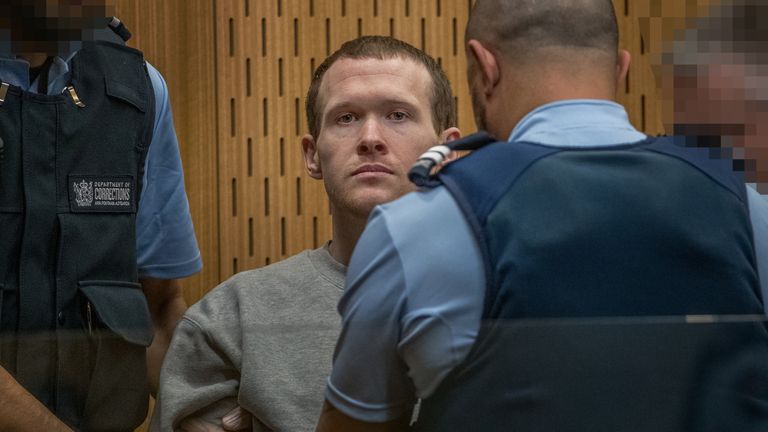Caleb Cain used to think like a white nationalist.
“Literally anyone can be radicalised,” he says, speaking from his own experience as someone who fell down the alt-right’s online ‘rabbit hole’.
The 27-year-old says it was like being “groomed into a cult”, and it wasn’t until he watched extreme violence unfold that he decided to get out.
After dropping out of college in 2012, Cain says he initially went online for “self-help” material. He then became entranced by alt-right commentators on YouTube.
Cain was watching thousands of videos about “male supremacy, racial supremacy, and cultural supremacy… anti-feminism, the dangers of Muslim immigration or the dangers of liberalism”.
Referring to the content as “propaganda”, Cain says he was lured in by the “epic drama” of it all.
“It was like I was in this whole other world. It was like a soap opera…And that’s what I was watching, I was watching a movie on a screen.”
Mental health struggles played their part. Cain was living with ADHD, anxiety and depression – and crucially, wasn’t receiving treatment for any.
He says his vulnerability was a key aspect of his descent into the alt-right’s world.
“I was being told that in order to get… all the things that I wanted in life – the stability, the happiness, that solid ground – that this was the pathway to doing that.”
The content Caleb was consuming started to manifest itself in his personality. He says he became more “abrasive, argumentative and increasingly more angry and negative”. These traits were already within him, he says, but the far-right messaging online was amplifying these traits.
Then an alternative perspective popped up into his online sphere: the Twitch streamer known as ‘Destiny’, whose modus operandi is to openly debate and contest the ideas of far-right personalities. Cain says it was this “counter-messaging” that made him start to question his newfound beliefs.
Escaping from the far-right movement became more urgent, Cain says, when two mosques were attacked in Christchurch, New Zealand in May 2019.
“I thought, well, this isn’t just some internet thing. This is going to keep happening. And that event… is the logical conclusion of a belief system as heinous as white nationalism.”
Cain was so affected by events, he decided to visit and meet Muslim community leaders in New Zealand, and credits his travel with a mentality shift.
“This very narrow world view that I’d been given, I realised that it was a lot more complicated, and that I had a lot more allies in places I didn’t expect.”
Having left the far-right movement, Cain now researches ways to disrupt it, and is concerned about its potential for violence.
“It’s almost like your country is full of sleeper cells, and that’s really, really, really, terrifying,” he says.
Extremism, disinformation and conspiracy theory were forced into the limelight on 6 January when pro-Trump protesters stormed the US Capitol.
The mugshots of those charged present a multi-faceted picture: far-right extremists; QAnon followers; militia group members; individual Trump supporters swept up in the moment.
In the wake of the attack, the Biden administration ordered an urgent review into the US violent extremism threat, and the Department of Homeland Security has said it plans to expand grants for studying and preventing online radicalisation and disinformation.
The most “terrifying” thing 6 January demonstrated, Caleb Cain says, is “this sort of broader tent that this [far-right] ideology is creating”.
“This fake populist, directionless movement, which riles people up and turns them against their governments and takes it basically to where a democracy can’t function.”
Cain says more research and intervention programmes are desperately needed. “No-one has a strategy,” he says. “There’s a lot of tactics, there’s a lot of plans, there’s a lot of ideas… but the professional fields are underfunded.
“The activist fields are completely in disarray, underfunded and understaffed, and volunteers online are not mobilised.”
After the events of 6 January, two other former far-right members – Tommy Robinson’s former cameraman Caolan Robertson and co-founder of Identity Evropa, Samantha – approached Cain to brainstorm a creative solution to the problem.
They have now founded a group called Future Freedom, which pitches itself as a community, a place to talk when you’re deep in the “rabbit hole”, aiming to “bridge the gap” between extreme movements and authorities.
They state: “We’re not counsellors, we’re just young people who went through it ourselves, who understand the push and pull factors that led you there.” A big ‘talk’ button is featured on their website, where users can anonymously share their stories.
Cain maintains that reframing the conversation around online extremism is crucial, advocating a move away from vilification, and towards empathy, “because if we keep approaching it from this very offensive, direct… calling people racist or trying to cancel people or push people out of society, it’s not going to work anymore”.
He says it’s not just young white men getting radicalised into this; it’s not just people out in the country; it’s not just Republicans; it’s not just the uneducated.
It’s literally everyone.




